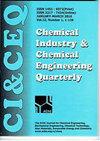An artificial neural network as a tool for kombucha fermentation improvement
IF 0.8
4区 工程技术
Q4 CHEMISTRY, APPLIED
Chemical Industry & Chemical Engineering Quarterly
Pub Date : 2022-01-01
DOI:10.2298/ciceq211013002c
引用次数: 0
Abstract
Kombucha as a tea-based fermented beverage has become progressively widespread, mainly in the functional food market because of health-improving benefits. As part of a daily diet for adults and children, kombucha stood out as a valuable non-alcoholic drink containing beneficial mixtures of organic acids, minerals, vitamins, proteins, polyphenols, etc. The influence of specific surface area of vessel, inoculum size, and initial tea concentration as operating parameters and fermentation time as output variable on the efficiency of kombucha fermentation was examined. The focus of this study is optimization and standardization of kombucha fermentation conditions using Box-Behnken's experimental design and applying an artificial neural network (ANN) predictive model for the fermentation process. The Broyden-Fletcher-Goldfarb-Shanno iterative algorithm was used to accelerate the calculation. The obtained ANN models for the pH value and titratable acidity showed good prediction capabilities (the r2 values during the training cycle for output variables were 0.990 and 0.994, respectively). Predictive ANN modelling demonstrated to be effective and reliable in establishing optimum kombucha fermentation process using selected operating parameters.人工神经网络在康普茶发酵过程中的应用
康普茶作为一种以茶为基础的发酵饮料已逐渐普及,主要是在功能性食品市场,因为它具有改善健康的好处。作为成人和儿童日常饮食的一部分,康普茶作为一种有价值的无酒精饮料脱颖而出,它含有有机酸、矿物质、维生素、蛋白质、多酚等有益的混合物。以容器比表面积、接种量、初始茶浓度为操作参数,以发酵时间为输出变量,考察了发酵效果的影响。本研究的重点是采用Box-Behnken实验设计,并应用人工神经网络(ANN)预测模型对康普茶发酵过程进行优化和标准化。采用Broyden-Fletcher-Goldfarb-Shanno迭代算法加速计算。所得的人工神经网络模型对pH值和可滴定酸度具有较好的预测能力(输出变量在训练周期内的r2分别为0.990和0.994)。预测人工神经网络模型被证明是有效和可靠的,在建立最佳的康普茶发酵过程中使用选定的操作参数。
本文章由计算机程序翻译,如有差异,请以英文原文为准。
求助全文
约1分钟内获得全文
求助全文
来源期刊

Chemical Industry & Chemical Engineering Quarterly
CHEMISTRY, APPLIED-ENGINEERING, CHEMICAL
CiteScore
2.10
自引率
0.00%
发文量
24
审稿时长
3.3 months
期刊介绍:
The Journal invites contributions to the following two main areas:
• Applied Chemistry dealing with the application of basic chemical sciences to industry
• Chemical Engineering dealing with the chemical and biochemical conversion of raw materials into different products as well as the design and operation of plants and equipment.
The Journal welcomes contributions focused on:
Chemical and Biochemical Engineering [...]
Process Systems Engineering[...]
Environmental Chemical and Process Engineering[...]
Materials Synthesis and Processing[...]
Food and Bioproducts Processing[...]
Process Technology[...]
 求助内容:
求助内容: 应助结果提醒方式:
应助结果提醒方式:


